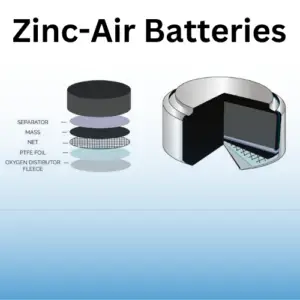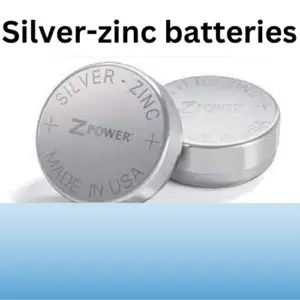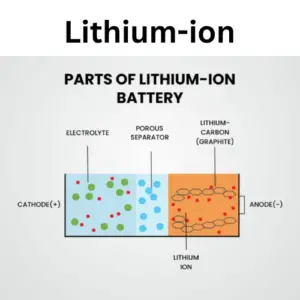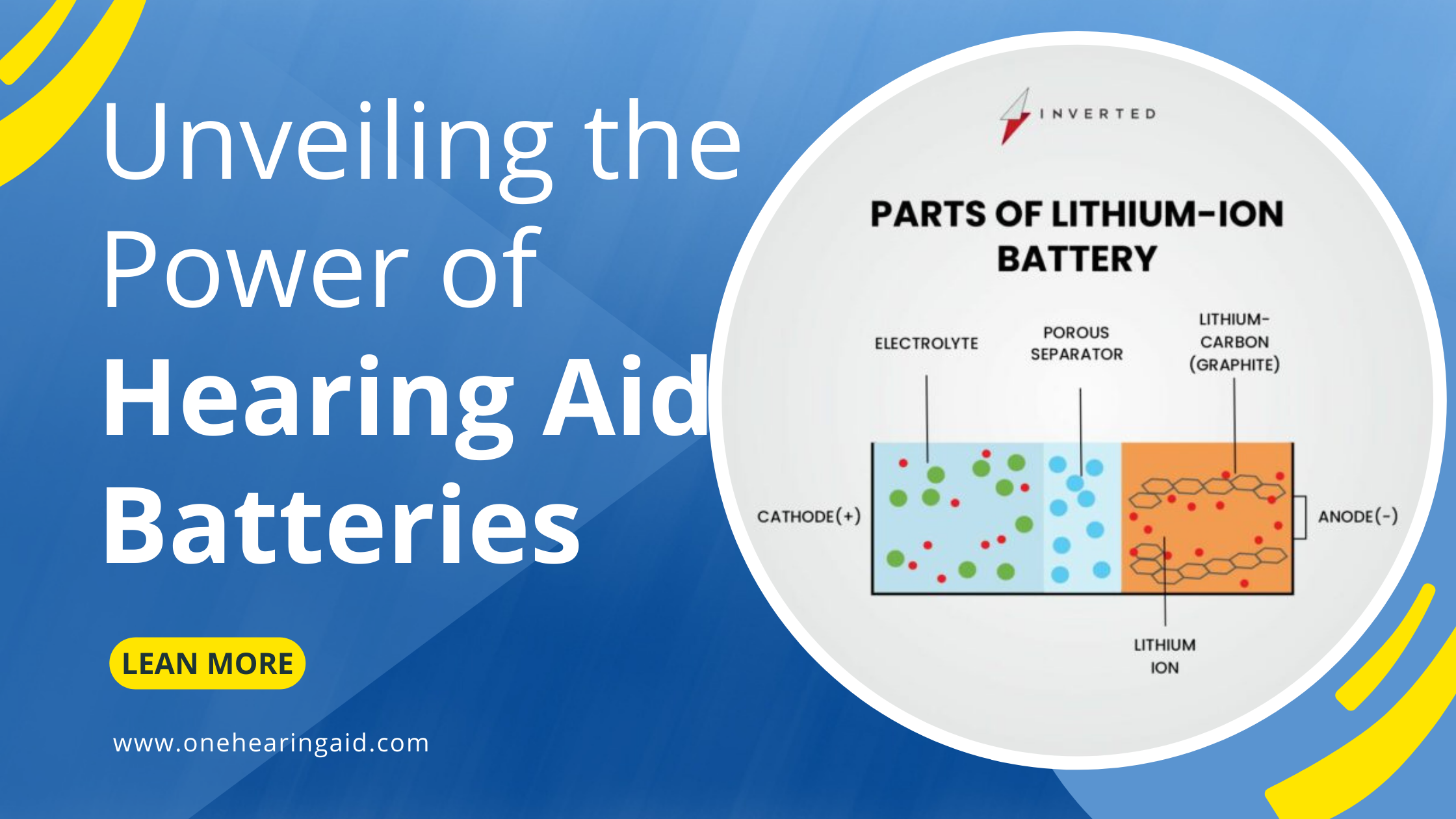Hearing aids are extraordinary gadgets that allow people with hearing problems to completely participate in their surroundings. The modest hearing aid batteries are critical component that is frequently ignored at the core of these devices. In this post, we’ll delve into the complexities of hearing aid batteries, looking at different kinds, variables influencing their longevity, and best practices for use.
Types of Hearing Aid Batteries
When it comes to hearing aid batteries, there is no one-size-fits-all solution. The market is dominated by three types: zinc-air, silver-zinc, and lithium-ion. Understanding the distinctions is critical for optimizing the effectiveness of your hearing aid.
Zinc-Air Batteries:

Providing the Energy for Better Hearing
Hearing aids are essential instruments for millions of individuals throughout the world, allowing them to connect with their environment and live life to the fullest. Zinc-air batteries are essential for powering these devices, and they have various benefits over other battery types:
The Advantages of Zinc-Air Batteries for Hearing Aids:
Small and lightweight: Zinc-air batteries are available in a variety of sizes to accommodate various hearing aid types, including inconspicuous in-ear and behind-the-ear devices. Their small size provides comfort and discretion in usage.
Long Life: When compared to other battery types, zinc-air batteries have a longer life. Depending on the size of the battery and the degree of hearing aid usage, they can last anywhere from a few days to several weeks.
High Energy Density: Zinc-air batteries pack a lot of power into a tiny space. This means that your hearing aid will have continuous power throughout the day, maintaining optimal performance.
Environmentally friendly: Unlike other types of batteries, zinc-air batteries are devoid of heavy elements such as mercury and cadmium. As a result, they are a more environmentally responsible option for environmentally minded consumers.
Convenient Air-Activated Operation: Zinc-air batteries have a protective tab that plugs the air vent. This stops the battery from activating until it is ready for use, so increasing shelf life and reducing the chance of accidental discharge.
Zinc-air batteries are widely accessible at pharmacies, internet merchants, and hearing aid clinics, ensuring that you may simply acquire replacements when needed.
Zinc-air batteries continue to be the most popular choice for powering hearing aids. Their size, longevity, energy density, and eco-friendliness make them a great alternative for people looking for dependable and long-lasting hearing aid performance. You can get the most out of your zinc-air batteries and guarantee your hearing aid offers clear, consistent sound throughout the day by following correct usage and storage requirements.
Silver-Zinc Batteries:

A Power Source Alternative for Hearing Aids
While zinc-air batteries are the most commonly used for powering hearing aids, silver-zinc batteries are a viable option. Although less common, silver-zinc batteries have certain characteristics that might be advantageous to select users.
Here’s an overview of silver-zinc hearing aid batteries:
The Advantages of silver-zinc Batteries for Hearing Aids:
Longer lifespan: Silver-zinc batteries have a substantially longer lifespan than zinc-air batteries, lasting many months on average. This means fewer battery changes and less maintenance for consumers.
Stable voltage: Silver-zinc batteries produce a more uniform and steady voltage output than zinc-air batteries. This results in improved sound quality and clarity throughout the battery life, especially at higher power settings of hearing aids.
Faster recharge: Rechargeable silver-zinc batteries recharge far faster than regular rechargeable hearing aid batteries. This might be a big benefit for consumers who need to charge their devices frequently.
No air activation: Silver-zinc batteries, unlike zinc-air batteries, do not require air activation. This eliminates the need for a protective tab, which simplifies storage and increases shelf life.
High energy density: Silver-zinc batteries provide a high energy density in a tiny package, making them excellent for smaller hearing aids.
Who should think about silver-zinc batteries:
Individuals that require high-power hearing aids may benefit from the consistent voltage and longer lifespan of silver-zinc batteries.
Active people: People who have active lives and often use their hearing aids may appreciate the convenience of fewer battery changes and extended battery life.
Those who value sound quality: Silver-zinc batteries may be an improved option for users who value constant sound quality and clarity.
Those who seek quick recharge times: People who need to charge their devices frequently may find the faster recharge periods of silver-zinc batteries to be a major benefit.
Overall, silver-zinc batteries provide a distinct alternative to standard zinc-air hearing aid batteries. Their extended lifespan, consistent voltage, and faster recharge periods make them an appealing option for specialized customers that value these characteristics. Their increased price and restricted availability, however, may be disadvantages for some. When deciding on the optimum battery type for your hearing aid, keep your own needs and preferences in mind. Consultation with your audiologist can give useful insight and assist you in selecting the best solution for your unique hearing needs and lifestyle.
Lithium-ion Batteries:

Lithium-ion batteries have transformed the way we power our electronics, providing exceptional performance and simplicity. This revolution is now spreading to the realm of hearing aids, with lithium-ion batteries emerging as a viable replacement for old zinc-air and silver-zinc batteries.
Here’s a look at the lithium-ion battery’s possibilities in hearing aids:
The Advantages of Lithium-ion Batteries for Hearing Aids:
Rechargeable: Lithium-ion batteries are rechargeable, which eliminates the need for regular replacement and lowers long-term expenditures. This is a huge benefit for people who find replacing batteries bothersome.
Longer longevity: Rechargeable lithium-ion batteries have a substantially longer lifespan than other types of hearing aid batteries. They may survive for years if properly cared for, giving a more sustainable and stable power source.
Faster recharge: Lithium-ion batteries often recharge significantly faster than other types of rechargeable batteries, frequently in just a couple of hours. This guarantees that you may return to enjoying clear and consistent hearing as soon as possible.
care-free: Unlike zinc-air batteries, which must be removed and stored properly, lithium-ion batteries require very little care. This makes them easier to use and reduces possible difficulties.
constant voltage: Lithium-ion batteries, like silver-zinc batteries, provide a constant voltage output, resulting in consistent sound quality throughout the battery life. This is critical for consumers that demand the best audio performance possible.
Compact size: Because lithium-ion batteries can be built in compact sizes, they can be used in even the most unobtrusive hearing aids. This enables manufacturers to design attractive and comfy gadgets without losing functionality.
While they are still in their early phases of use, lithium-ion batteries provide an intriguing vision for the future of hearing aids. They are a viable replacement to traditional batteries because to their extended lifespan, quick recharging times, and ease. As technology progresses and costs fall, lithium-ion batteries will likely become the major power source for hearing aids, providing consumers with dependable, long-lasting, and sustainable hearing solutions.
Factors Affecting Battery Life:
Have you ever wondered why those hearing aid batteries don’t seem to last as long as you’d like? Well, there are a bunch of everyday things that can affect how much juice these little guys provide for your hearing aids.
- Battery Types: So, each hearing aid model has its preference when it comes to batteries. It’s a bit like picking your favorite brand – some just stick around longer than others.
- Size Talk: You know, those tiny batteries come in different sizes. Like choosing between a small or large coffee, the bigger ones tend to keep going for longer.
- How Much You Use Them: It’s kind of like your TV remote – the more you press those buttons, the quicker it runs out of battery. Same goes for hearing aids. More use means a faster drain.
- Fancy Features: If your hearing aids have some cool extras like Bluetooth or noise reduction, they’re like power-hungry apps on your phone. Turning off the extras when you’re not using them can give your batteries some breathing space.
- Weather Chatter: Just like extreme weather affects your mood, it affects batteries too. So, try not to leave your hearing aids baking in the sun or freezing in the cold.
- Storage Secrets: Think of your batteries like chocolate – store them in a cool, dry place away from direct sunlight, and they’ll thank you with better performance.
- Quality Check: Not all batteries are born equal. Opting for the good stuff might mean fewer annoying trips to the battery drawer.
- Handle with Care: Treat your batteries like they’re made of glass. They might not be, but being gentle with them and popping them in correctly goes a long way. Always read the battery handbook, just like you would with a new gadget.
- Freshness Rules: Even if you haven’t hit the ‘on’ switch, batteries age. Start with the newbies first for a longer-lasting show.
- Your Hearing, Your Power: Your specific hearing needs are like the unique tastes in your music playlist. They determine how much power your hearing aids need, which, in turn, affects battery life.
Remember, following the manual and being mindful of your hearing aid habits can help you get the most out of your batteries. If you ever feel like they’re not holding up their end of the bargain, chat with your hearing care expert for some personalized advice.
Conclusion:
In a nutshell, keeping your hearing aid batteries happy is a bit like conducting a beautiful symphony. Think of choosing the right battery type and considering sizes as selecting the perfect instruments for a harmonious performance. Treating your batteries with care—like shielding them from extreme weather and opting for high-quality ones—is akin to giving your musicians the best tools. It’s also like starting with fresh batteries for a lively show. Your unique hearing needs take center stage, influencing how long the batteries keep the music playing. So, follow the user manual, and if there’s ever a hiccup in the melody, chat with your hearing care expert for a long-lasting harmony between your hearing aids and their batteries.
FAQ:
- How long will hearing aid batteries last?
Ans: Hearing aid batteries can be last for 5-6 days depends on usability of the user. - What is the 5 minute rule for hearing aid batteries?
Ans: After taking out the fresh battery and peeling off the plastic cover, refrain from inserting it into your hearing aid right away. It’s advisable to wait for about 5 minutes, as this duration permits sufficient air to circulate through the surface holes, ensuring the complete activation of the battery’s power centers. -
How long does the battery last in an in ear hearing aid?
Ans: Hearing aid batteries typically have a lifespan of approximately seven days. However, incorporating a few straightforward practices can extend their usage by a couple of days, resulting in significant gains over the course of a year. Here are some suggestions to maximize the longevity of your batteries.
Read More On Hearing Aids:



3 thoughts on “Unveiling the Power of Hearing Aid Batteries”